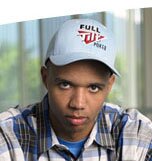Keith Sexton
May 29, 2006
In an earlier article, Perry Friedman gave some guidelines as to what you should be looking for at the start of a Seven-Card Stud hand. Perry concentrated on third street, when you make your initial decision to proceed with the hand or not. For this tip, I'd like to go further down the road and talk about fourth street.
When playing Stud, fourth street is the last of the smaller betting rounds. On fifth street, the bets double, so if you decide to play beyond fourth street, your investment in the hand is going to be hefty.
On fourth street, I look to see if an opponent has picked up a card that has a relation to the door card (the first up card). If fourth street builds straight or flush possibilities for my opponent, I'm likely to muck a lot of hands; if it appears to be a complete blank, I'll usually continue.
For example, say one player open-raised with the Qd as a door card, and I called with split 8s and a suited 6. If he catches a total blank (something like the 2c) on fourth street and bets, I'm likely to continue and see if fifth street brings either of us any help. On the other hand, I will probably dump the hand if my opponent catches anything between a Ten and an Ace, and I don't improve.
I won't know for sure if a Ten, Jack, King or Ace helps my opponent's hand, but at that point, his board presents too many warning signs for me to continue. Many players will enter pots when they start with three big cards, so any high card on fourth street has the potential to make my opponent a big pair or get him closer to a straight. Either way, my eights are pretty flimsy.
Another sort of situation develops when I catch two-pair on the turn. Say that I started with a split pair of 8s and a 6. My opponent open-raised with the Qd and I called. The turn brings me another 6, giving me two pair. My opponent catches a blank and bets.
In a spot like this, I think raising is a big mistake because the two-pair is well hidden. If I raise on fourth street and happen to catch a boat on fifth or sixth street, it will be almost impossible for my opponent to continue with the hand after my show of strength. He'll have to assume that I've hit and he'll fold to a bet. If, however, I just call on the turn and then hit a 6 later in that hand, my opponent may continue with his pair of Queens.
Moving on to a third example, say I have Kings in the hole with the 6d as my door card. Again, assume my opponent open-raised while showing Qd on third street. In this spot I'm likely to just call my opponent's raise on third street. If I were to re-raise with a 6 as my door card, I'd be announcing that I held a big pocket pair. My opponent would probably fold and I wouldn't get any value out of a nice hand.
After I call the third-street raise, I'm hoping that the turn brings a card like the 8d. If my opponent then leads at the pot, I'll raise, hoping to give the impression that I'm on a draw. Once my opponent has that impression, he'll probably call my raise on fourth street. If fifth street appears to be a blank, he'll probably call a bet there as well. I'll be building a nice pot while holding a strong hand.
These are just a few situations you might run into on fourth street. If you play your hand correctly at this point, you stand to pick up some big bets on later streets when things go well, and save some bets when things go south.
Keith Sexton
|



